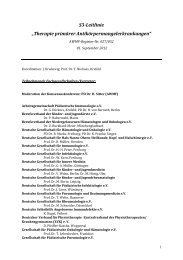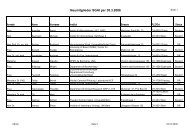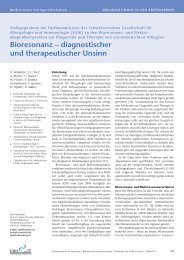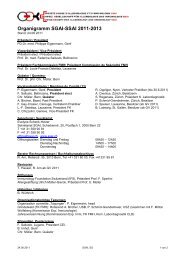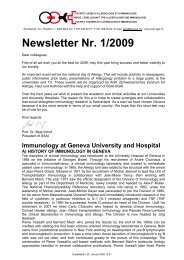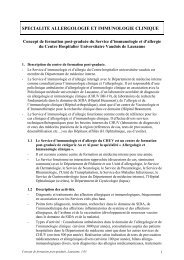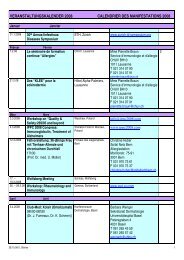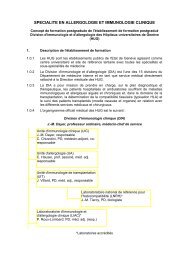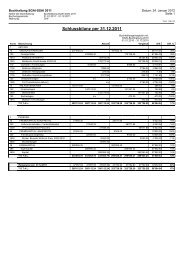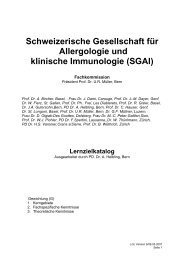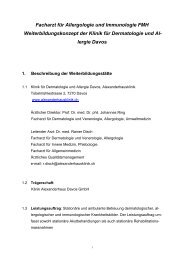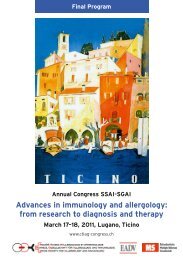Preliminary Programme - EAACI
Preliminary Programme - EAACI
Preliminary Programme - EAACI
You also want an ePaper? Increase the reach of your titles
YUMPU automatically turns print PDFs into web optimized ePapers that Google loves.
<strong>Preliminary</strong> Scientific <strong>Programme</strong><br />
Saturday, 16 June continued<br />
11:00 – 14:00<br />
<strong>EAACI</strong>/UEMS Exam<br />
<strong>EAACI</strong> provides the European Knowledge<br />
Examination for Allergy and Clinical Immunology. It<br />
will take place for the fifth time at the <strong>EAACI</strong><br />
Congress 2012 in Geneva. It includes about 100<br />
multiple-choice questions in English. Candidates<br />
have 180 minutes to complete the exam. It does<br />
not replace or substitute the currently existing<br />
national examinations that are regularly held by<br />
national bodies. The view is that this examination<br />
will help to further increase the standard of<br />
Allergy/Clinical Immunology in Europe, and<br />
facilitate the exchange of young people trained in<br />
Allergology and Clinical Immunology in Europe.<br />
Everybody has the opportunity to use this<br />
knowledge test as a tool for self-evaluation.<br />
14:00 – 17:30<br />
Postgraduate Courses<br />
Pre-registration required.<br />
Postgraduate course 1<br />
Managing difficult issues in food allergies<br />
Eosinophilic oesophagitis<br />
Alex Straumann, Switzerland<br />
Food allergy and atopic dermatitis<br />
Thomas Werfel, Germany<br />
Assessing the risk of anaphylaxis in patients<br />
with oral allergy syndromes<br />
Karin Hoffmann-Sommergruber, Austria<br />
Solving practical issues in food challenges<br />
Bodo Niggemann, Germany<br />
Ready for SOTI?<br />
Katharina Blümchen, Germany<br />
Postgraduate course 2<br />
Diagnostic tools and exposure monitoring<br />
in occupational allergies<br />
Occupational contact dermatitis – how to find<br />
the culprit and how to diagnose a type IV skin<br />
disease<br />
Kristine Breuer, Germany<br />
In vivo and in vitro diagnosis of occupational<br />
type I allergy – classical and new<br />
complementary methods<br />
Monika Raulf-Heimsoth, Germany<br />
Non-invasive methods – how suitable are they<br />
to assess occupational allergic airway<br />
diseases?<br />
Torgeir Storaas, Norway<br />
Allergen monitoring at the workplace – impact<br />
of exposure measurements for improvement<br />
of diagnosis<br />
Gert Doekes, The Netherlands<br />
20 www.eaaci2012.com<br />
Postgraduate course 3<br />
Accurate diagnosis and treatment of<br />
ocular allergy<br />
Examination of the eye by the non-specialist<br />
allergist<br />
Anna Groblewska, Poland<br />
Conjunctival provocation tests<br />
Bruno Mortemousque, France<br />
Management of vernal allergic conjunctivitis<br />
Andrea Leonardi, Italy<br />
Specific immunotherapy for conjunctivitis<br />
Jean-Luc Fauquert, France<br />
Postgraduate course 4<br />
Diagnostic tools in rhinology<br />
History and non-invasive measurements of<br />
nasal inflammation<br />
Glenis Scadding, United Kingdom<br />
Evaluation of nasal patency<br />
Peter Hellings, Belgium<br />
Diagnosis of allergic rhinitis<br />
Elina Toskala, United States<br />
Microbiology and radiologic imaging<br />
Livije Kalogjera, Croatia<br />
Postgraduate course 5<br />
Epidemiology for the clinical allergist<br />
Study design: ecological and cross-sectional<br />
Carsten Flohr, United Kingdom<br />
Study design: case-control and cohort<br />
George Konstantinou, United States<br />
Basic statistics<br />
Kirsty Logan, United Kingdom<br />
Designing and planning a clinical allergy study<br />
Michael Perkin, United Kingdom<br />
Open discussion and Q&A<br />
All<br />
This course is a must for all allergists involved in<br />
clinical trials! Each participant will receive a<br />
certificate for 4 hours of continuous medical<br />
education in “Good Clinical Practice” at the end of<br />
the course.<br />
Postgraduate course 6<br />
New therapeutic approaches for severe<br />
asthma in childhood and adolescence<br />
Monitoring severe asthma<br />
Graham Roberts, United Kingdom<br />
New pharmacotherapy for severe asthma in<br />
children<br />
Gunilla Hedlin, Sweden<br />
Biologicals<br />
Riccardo Polosa, Italy<br />
New anti-IgE preparations?<br />
Ulrich Wahn, Germany<br />
Postgraduate course 7<br />
Practical issues in contact allergy and<br />
urticaria<br />
Expert tips on patch testing<br />
Antti Lauerma, Finland<br />
Testing for photoallergy<br />
Radoslaw Spiewak, Poland<br />
Contact urticaria<br />
Jürgen Grabbe, Switzerland<br />
Physical challenge testing<br />
Markus Margerl, Germany<br />
Skin testing in urticaria<br />
Ulrike Raap, Germany<br />
Postgraduate course 8<br />
Do’s and dont’s of drug allergy<br />
Immediate reactions: symptoms, elicitors and<br />
avoidance<br />
Knut Brockow, Germany<br />
Delayed reactions: symptoms, elicitors and<br />
avoidance<br />
Kathrin Scherer, Switzerland<br />
Diagnostic possibilities: Immediate reactions<br />
Ingrid Terreehorst, The Netherlands<br />
Diagnostic possibilities: Delayed reactions<br />
Maria Jose Torres, Spain<br />
Postgraduate course 9<br />
Update on Allergy & Clinical Immunology<br />
laboratory diagnosis<br />
Are recombinants always the best choice?<br />
Markus Ollert, Germany<br />
It’s time for basophil tests!<br />
Hans-Jürgen Hoffmann, Denmark<br />
Finding your way through auto-antibodies<br />
Pascale Roux Lombard, Switzerland<br />
The place of “omics” in the diagnostic lab<br />
Christian Scharf, Germany<br />
Postgraduate course 10<br />
Specific immunotherapy,<br />
100 years +1 update<br />
Looking beyond evidence-based in<br />
immunotherapy<br />
Moises Calderon, United Kingdom<br />
Good clinical practice in immunotherapy<br />
Oliver Pfaar, Germany<br />
Choosing the right extract for immunotherapy<br />
Rudolf Valenta, Austria<br />
Subcutanoeus or sublingual immunotherapy?<br />
Stephen Durham, United Kingdom



